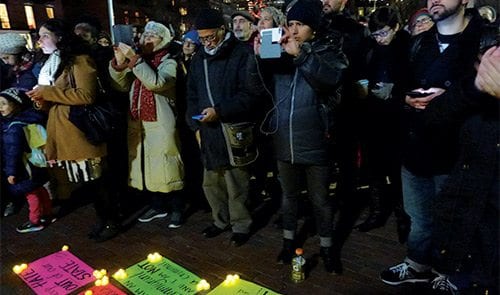
Announcements of Immigration and Customs Enforcement raids on undocumented Central American immigrants last week sent tremors of fear across the nation’s immigrant communities. Over New Year’s weekend, 121 individuals were rounded up and sent to a Texas facility to be processed for deportation. Most were women and children residing in Georgia, Texas and North Carolina.
Rumors — later rejected — spread that local raids were made in East Boston, Chelsea and Revere. Last Wednesday, a crowd gathered on the State House steps for a candlelight vigil protesting ICE’s intensified tactics. Speakers decried deportations as a threat to human life.
Immigration activists and immigrants charge that the aggressive crackdown turns a blind eye to a desperate humanitarian need. They claim that many who arrive illegally from Central America are escaping extreme violence and have not had proper opportunity to make their case for asylum.
“We have a double standard emerging where asylum seekers from overseas — especially the Syrian refugees that were so hotly debated in Congress — were recognized as needing protection under our asylum laws, and the president spoke of needing to assure protections for them.” George Chen, director of advocacy for the American Immigration Lawyers Association, told the Banner. “And yet the president has never acknowledged that the Central American population is fleeing from tremendous violence … and is qualifying for asylum here. [The president] continues to treat them as illegal border-crossers and that needs to come to an end.”
Extreme violence
Cairo Mendes, a Brazilian immigrant and lead organizer of the Student Immigration Movement, said at the vigil that in many cases, deportations are “sentencing us to our death.” Speakers from El Salvador and Guatemala added their voices, recounting tales of murders, gang violence and threats to their families’ lives that spurred them to flee their home countries.
An example underscoring their accounts: murders in El Salvador rose by 70 percent from 2014-2015, and the country’s homicide rate has reached a higher level than that held by any other country in the last 20 years, according to USA Today.
Asylum appeals
On the web
Your rights in a raid: http://www.incite-national.org/page/know-your-rights-case-immigrationpolice-raid
Statement by Jeh Johnson: http://www.dhs.gov/news/2016/01/04/state ment-secretary-jeh-c-johnson-southwest-bor der-security
The raids are part of a Department of Homeland Security move to increase deportation of illegal immigrants caught crossing the southern border after May 1, 2014. According to a press release issued by DHS Secretary Jeh Johnson, the roundups focus on cases where there are no other legal options, an immigration court has given final orders for the individual’s removal and the individual has no outstanding appeal or claim for asylum or other humanitarian relief. Families and unaccompanied children are not exempt, he emphasized.
Activists contest that immigrants do not always get sufficient resources to allow them to make their case for asylum and that in some cases raids have been used despite the presence of other modes of legal recourse.
Patricia Montes is the executive director of Centro Presente, the organization that convened the vigil. She said her organization is one of many that provide free legal counsel to immigrants seeking asylum, but that there are not enough services to meet the high demand. The detainment of families in remote locations also creates a significant barrier to gaining access to counsel, Chen said.
And lawyers make a huge difference.
“Government statistics show a person is much more likely to be able to demonstrate their eligibility for asylum if they have counsel,” Chen said. “It’s impossible to imagine a mother with young children, who speaks no English, who has no knowledge of American legal structures or immigration laws, that she could explain to an official or judge that she needs asylum.”
Root battles and causes
But the legal case is only one piece of the immigration policy argument. The bigger underlying issue, say immigrants and activists, is that not enough is being done to protect the lives of vulnerable people.
The raids are viewed as an escalation of Obama administration efforts to deter Central American immigration, Chen said. “These raids … are consistent with the refusal of this administration to acknowledge that these are people that are in flight from real violence and should be protected in our country.”
Centro Presente’s Montes said, “The authorities know most of these people are refugees that are fleeing violence and instability in Central America.”
As a tactic, ICE’s raids fail to confront the structural issues inspiring mass immigration to the U.S., Montes said. Instead, the U.S. and Central American governments should develop policies to change the systemic forces contributing to cycles of violence and poverty in the country.
DHS has acknowledged a similar reality and the federal government is making efforts toward that end.
“More border security and removals, by themselves, will not overcome the underlying conditions that currently exist in Central America,” Johnson wrote. “To effectively address this situation, we recognize that we must offer alternatives to those who are fleeing the poverty and violence in Central America … I am pleased that Congress, in the recently-enacted omnibus spending bill, included $750 million in aid for Central America.”
The $750 million spending bill passed by Congress last month is targeted at improving security, economic development and governance and combating gang violence in El Salvador, Guatemala and Honduras. To force government reform, dispersal of the full funds hinges on the countries implementing of steps such as prosecuting corrupt officials and increasing professionalism of police forces. Another element: a quarter of the money will be provided only if the governments make efforts to improve border security and spread information on the dangers of traveling to the U.S.
Johnson also announced a ramping up of efforts to develop new screening and processing methods for Central American refugees and an expansion of access to the U.S. Refugee Admissions Program.






